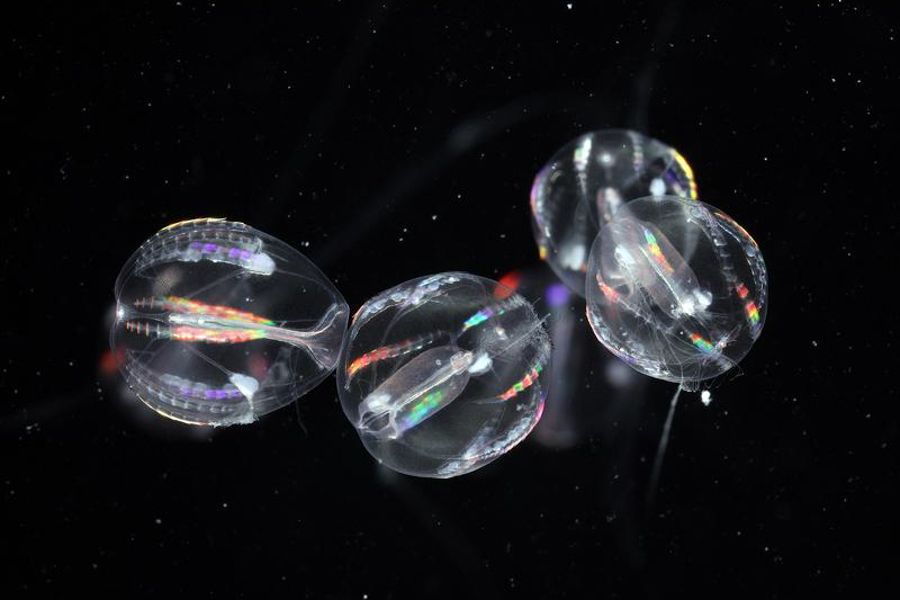Public evening lecture: Evolutionary hanging game or leap innovation – News from the first brains
How did the first nerve cells and brains develop? And what does this question have to do with comb jellies (Ctenophore)? All interested parties are cordially invited to the public evening lecture on September 27 at 8 pm, where Prof. Dr. Fred Wolf from the University of Göttingen and the Max Planck Institute for Dynamics and Self-Organization will take the audience on a journey to the origins of brains and into the depths of the oceans. The lecture is part of the Bernstein Conference 2023, which is organized by the Bernstein Network Computational Neuroscience, the Humboldt University of Berlin and the Charité.

Ctenophore, Photo: Joan J. Soto-Angel
Complex nervous systems like the human brain are the result of a long sequence of key neuronal innovations. The first steps on this long road consisted in the evolution of the first neurons, synapses, nerve networks and neuronal processing centers. Did the original invention of a nervous system succeed only once in the history of life, or are nervous systems so useful that they could arise independently on separate evolutionary paths? How far is the step from the first multicellular animal to the first functional synapse? Are there general principles of neural circuit construction that have governed all subsequent nervous systems from the construction of the first to our own? Questions like these arise at the interface of theoretical neuroscience and organismal evolutionary biology. Advances in the past decade are currently opening up new and surprising approaches to answering them. In particular, the suspicion that complex nervous systems may have evolved independently several times has been strengthened. “News from the first brains” provides insight into the theoretical reconstruction of the early evolution of synapses, neurons, and brains; into the world of fascinating marine organisms that can serve as living archives of the early history of the nervous system; and asks what insights the study of key evolutionary innovations might open up in the general field of theoretical neuroscience.
Location: Audimax 2, Philippstraße 13, 10115 Berlin.
The best way to get to the campus is via Luisenstraße 56. There will also be a wardrobe.
Date: Wednesday, September 27, 2023
Time: 8:00 p.m.
Language: German
Admission free
Press
Representatives of the press are cordially invited to the entire conference. Please register at the information desk with your press card. Interviews can be arranged upon request.
More details can be found here:
https://bernstein-network.de/bernstein-conference/general-information/press/
Bernstein Network Computational Neuroscience
The Bernstein Conference is the annual conference of the Bernstein Network Computational Neuroscience. It has become the largest annual conference in this field in Europe attracting experts from all over the world.
The Bernstein Network is a research network in the field of computational neuroscience; this field brings together experimental approaches in neurobiology with theoretical models and computer simulations. The network started in 2004 with a funding initiative of the Federal Ministry for Education and Research (BMBF) to develop and interconnect regional research structures in computational neuroscience throughout Germany and to promote the transfer of theoretical insight into clinical and technical applications. In this context, computational neuroscience joins experimental approaches in neurobiology with theoretical models and computer simulations. The network is named after the German physiologist and biophysicist Julius Bernstein (1839-1917). After more than 10 years of funding by the Federal Ministry, the Bernstein Network consists of more than 200 research groups. Since 2016, the continuity of the network is sustained by the non-profit association Bernstein Network Computational Neuroscience.




